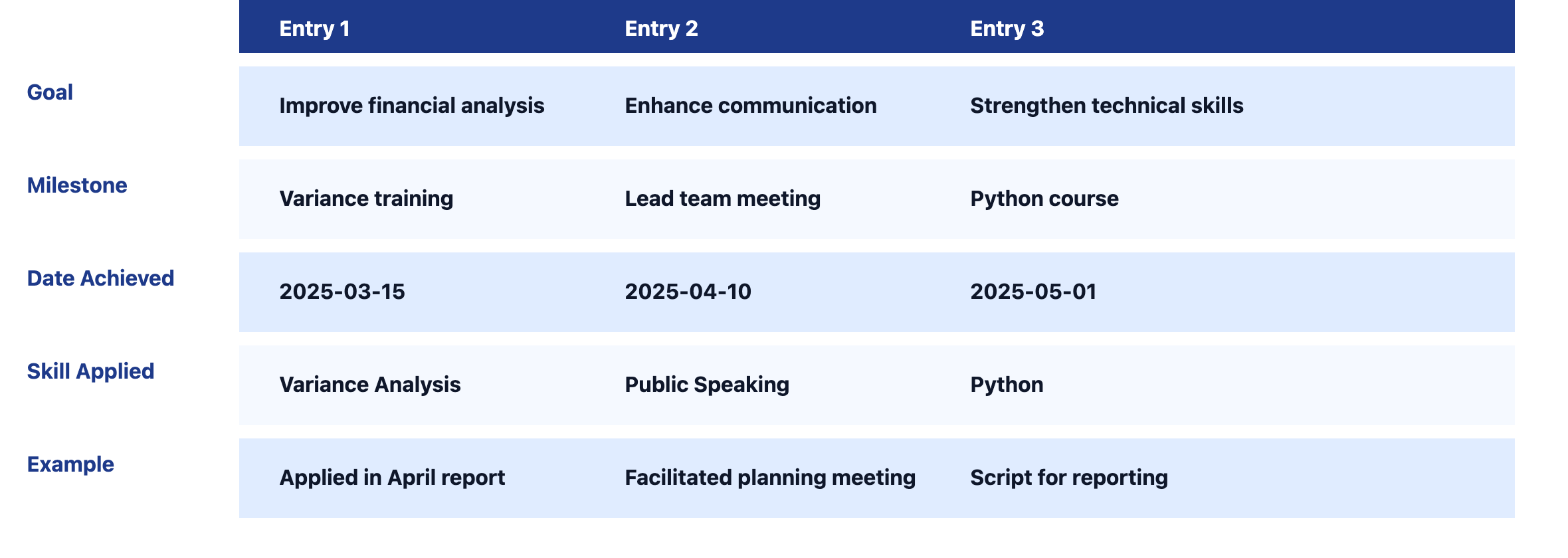When checking in on development goals, your approach matters as much as the content. Aim to make these conversations feel supportive rather than evaluative. For example, instead of asking "Did you finish the variance analysis training yet?", try "How is the variance analysis training going? Have you come across any concepts that are especially useful or challenging for our monthly reporting?" This signals genuine interest in their experience, not just the outcome. Recognize effort and incremental progress, such as saying "I’ve noticed you’re consistently applying new techniques in your monthly reports—great commitment!" This kind of acknowledgment builds trust and keeps motivation high, even if the goal isn’t fully met yet.
In your 1:1s, you can use “progress mapping” by asking your team member to briefly outline what they’ve learned so far and how they’ve applied it to a recent finance task (for example, a new approach to cash flow forecasting or a more detailed budget variance analysis). This keeps the conversation practical and relevant to their day-to-day work, and helps you spot opportunities for further support or recognition.
Effective feedback is a blend of authentic recognition and actionable suggestions. Start by highlighting what’s working: "Your presentation of the quarterly forecast to the leadership team was clear and data-driven—well done." Then, offer a specific area for growth: "One area to keep building on is anticipating follow-up questions about our assumptions. Would you like to do a mock Q&A before the next meeting?" Avoid the classic “praise sandwich” if it feels forced; instead, focus on being direct, specific, and supportive in both your praise and your coaching. This approach helps your team feel valued while still encouraging continuous improvement.
Here’s a short dialogue that demonstrates these principles in action:
- Jessica: Hi Ryan, I wanted to check in on your progress with the financial modeling course. How’s it going so far?
- Ryan: Thanks for asking, Jessica. I’m about halfway through. Some of the advanced sections are a bit tough, but I’m making steady progress.
- Jessica: I’ve noticed you’ve been blocking time each week to work on it—great commitment! Have you been able to apply any of the new techniques to our recent budget models?
- Ryan: I tried using scenario analysis for the Q2 forecast, but I’m not sure I fully grasp all the techniques yet.
- Jessica: That’s understandable; it’s a complex topic. Your dedication is clear, and your last model looked much more robust. If you’d like, we can review the scenario analysis section together next week and see how it fits with our current forecasting process. How does that sound?
- Ryan: That would be really helpful, thank you!
In this exchange, Jessica reviews progress with empathy, recognizes Ryan’s effort, and offers targeted coaching. She also uses progress mapping by asking about the application of new techniques to real finance work.
Keeping development on track requires regular, visible attention. As a finance manager, make growth a standing topic in your 1:1s by asking questions like "What’s one finance skill you want to focus on this month?" or "Is there anything getting in the way of your progress on the new reporting process that I can help with?" Use brief reminders or shared notes to keep goals top of mind.
You may wish to set up a shared “development tracker” in your team’s project management tool or a simple spreadsheet. Use it to log goals, milestones, and recent applications of new skills (for example, “Applied new variance analysis method in April report”). Refer to this tracker during your check-ins to keep development visible and actionable. This helps ensure that progress is recognized and obstacles are addressed promptly. Your development tracker may look something like this:

By mastering these techniques you’ll foster an environment where development is continuous and meaningful. Up next, you’ll have the chance to practice these skills in a role-play scenario, balancing encouragement and constructive feedback in a real-world finance conversation.
